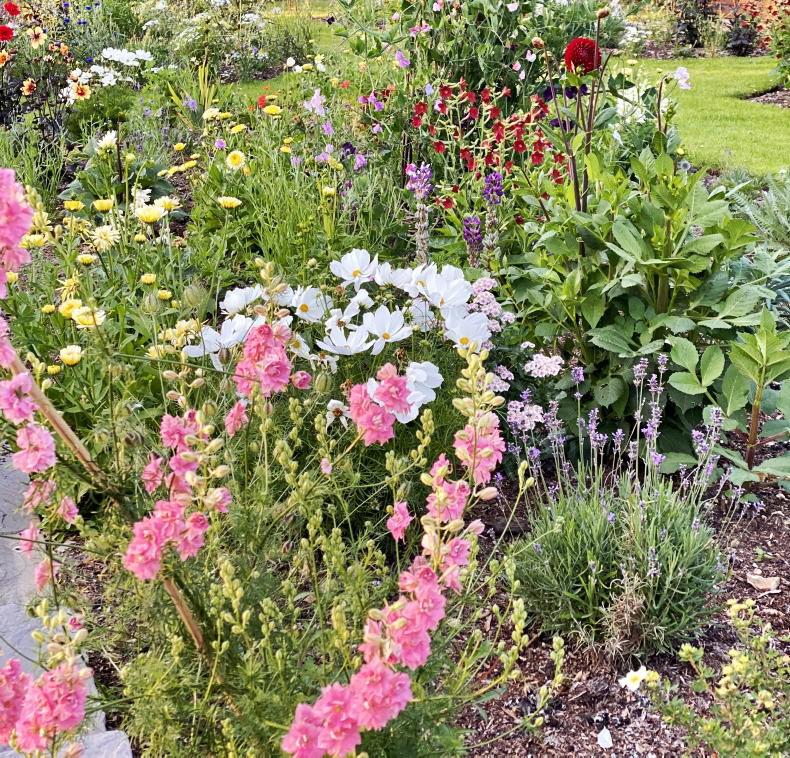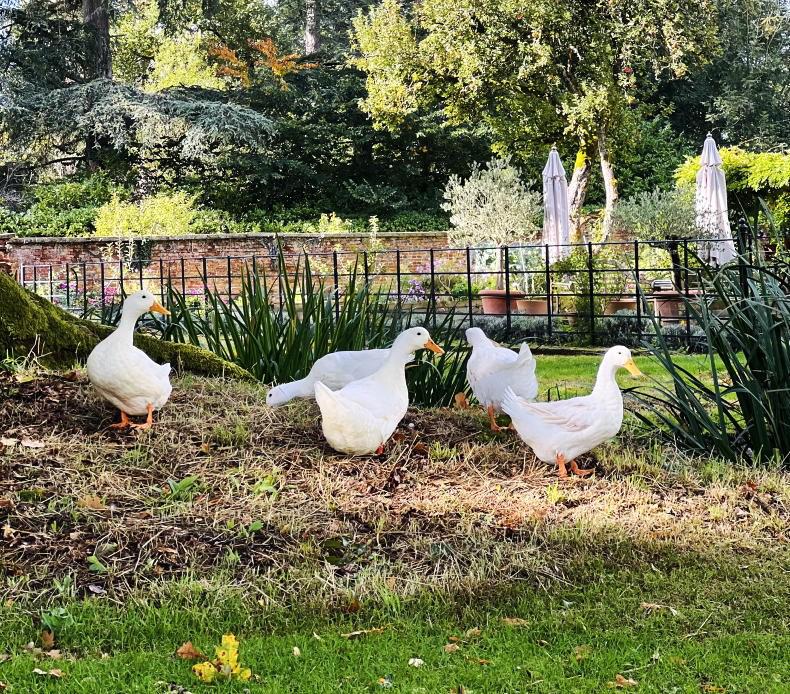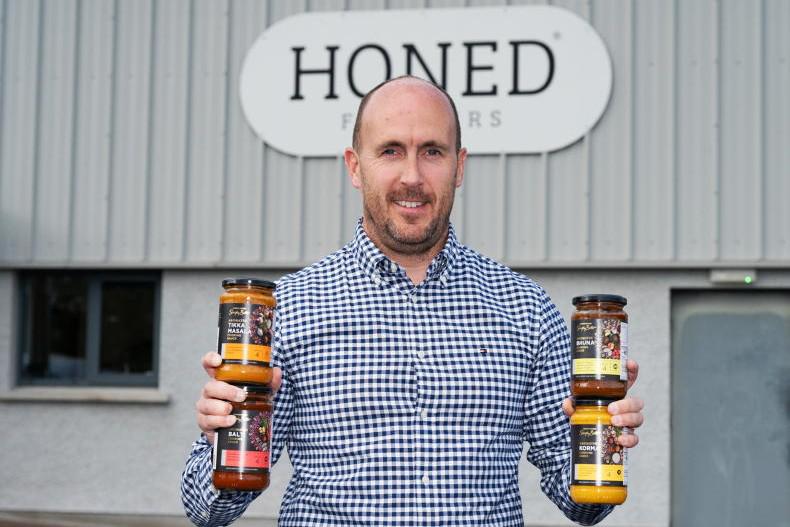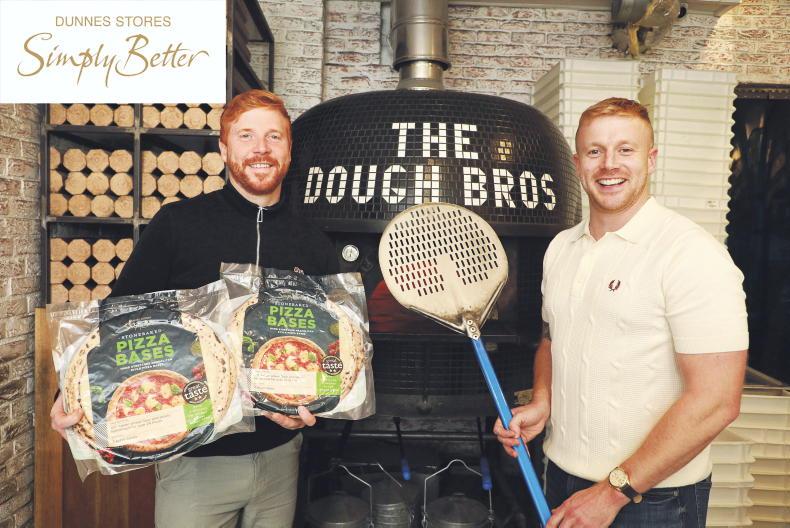What’s a chef to do once they’ve opened restaurants, authored cookbooks, created popular television programmes and continued to make regular television appearances?
For Cork native Clodagh McKenna, the answer is simple: start a farm.
More specifically, Clodagh and husband Harry Herbert (CEO of Highclere Thoroughbred Racing and the Royal Ascot Racing Club) decided to take on 100ac of Harry’s family’s land in Highclere Park, which is located in Hampshire, in the UK. Together, they have created a regenerative rural haven and called it Broadspear.
They grow vegetables, raise cattle, pigs and chickens, manage their trees and keep bees. Most of us are well aware of Clodagh’s storied career and achievements in the world of food. Now, the farm is taking the front seat.
While it might be a quieter sense of achievement than a restaurant opening or television series, Clodagh tells Irish Country Living that learning to farm has been the highlight of her life.
Growing food
“I grew up in the countryside, but I didn’t know how to grow,” she says. “I didn’t have any knowledge of the soil, or how sustainability truly works, or how wonderful animals are for our environment. [Starting the farm] was a big learning curve, but it’s
been amazing.
“We moved there six years ago and there wasn’t a plant growing; it was kind of a forgotten part of the park,” she recalls.
“But the land was so beautiful. Over those six years, we put all our energy into turning it into a working, sustainable farm. It took three to four years to really get it going in a full cycle.”
Learning to farm
Clodagh and Harry learned to farm as they went; starting with removing masses of overgrown laurel, which was absorbing groundwater and affecting the trees.
They learned as much as they could about the soil, started keeping bees and set about restoring the resident one-acre walled garden, which had been neglected for some time.
“It was covered with black ivy and had been used as a dump before we went in there,” Clodagh says. “We worked for about a year on that – levelling it, turning all the soil, building raised beds and getting all of our vegetables and fruits growing.
“If anyone ever asks me, ‘how do you get a garden going?’ I say, ‘just plant’,” she adds. “It’s amazing – when you start teaching yourself [to grow vegetables], all of a sudden, you grow green fingers. No one is born with green fingers; you have to learn it yourself.”

In addition to the vegetable gardens at Broadspear. Clodagh also has a cut flower garden.

Aside from chicken, pigs and cows, Clodagh also has geese at Broadspear.
From restoring the walled garden, Clodagh and Harry then incorporated chicken and cattle to their farm.
“We have beautiful Aberdeen Angus cows,” she says. “Maybe a lot of people wouldn’t know this if they don’t know about the countryside or farming, but I learned cattle are the absolute best way to manage
grassland. They’re so good for our environment.
“I get very passionate – and also upset – when people talk negatively about cows and beef,” she adds. “For people who don’t live in the country or don’t know farming, they might not realise that we all get to enjoy this beautiful countryside thanks to the work of farmers.”
Home comforts
Though Broadspear is now home for Clodagh (she and Harry even have their own secret pub on the farm for when a sudden Guinness craving strikes), they also spend time in their London home. Clodagh also goes home to Cork as often as she is able.
“The first thing I do when I get to Cork is go to the English Market,” she says.
“That makes me feel really at home; I grew up running through the market while my mom and dad were shopping. I always go there and do a shop – to buy things to bring back to England, but also to eat while
I’m there.
“I’m literally just back from Cork two days ago,” she adds, laughing. “When I’m home, I want crab and fresh fish; oysters, soda bread and all our amazing farmhouse cheeses, but I also think Irish cooking has evolved so much.
"There are amazing chefs all around the country doing really wonderful things with food, so I think we’re lucky: we have this wonderful history of all the one pot, comforting foods – the smoked salmon; the seafood – and then we have these creative chefs doing exciting things.”
Growing up in the 1970s and 80s, the food in Clodagh’s household was simple but always homemade. She and her siblings were all expected to do their bit around the house; especially during mealtimes.
“We were a family of six and we always sat down for dinner every night at 6pm,” she recalls, smiling.
“We all had our different chores; we were all involved. We weren’t a ‘foodie family’ as we might know them today, but everybody got stuck in – we made soda bread or got going with the stews or broths.”
Making food a career
It wasn’t so long ago that people would go to cookery school or catering college with the sole aspiration of becoming a restaurant chef.
There were no social media ‘food influencers’, the Food Network wasn’t a thing and publishing a cookbook was limited to a very few beloved chefs.
“Back then [in the 1990s], if you were going to learn how to cook, you were going to be a chef and that was it – there weren’t any other options,” Clodagh says.
“I was 23 years old when I went to Ballymaloe, and it was then that I really understood: this is absolutely what I want to do. I took out the loan, did the course and I just fell in love with it. And then I stayed at Ballymaloe for a further three years in the kitchen; it was brilliant.”
After Ballymaloe, Clodagh started working with local farmers markets and got involved in Slow Food Ireland.
Part of this work included organising some very large scale food events which focused on connecting everyday consumers with food producers and farmers. She says the work was hard and the hours long, but she was proud of the results.

Chef Clodagh McKenna on the farm at Broadspear, which is found in Highclere Park in Hampshire.
“I suppose, as someone who
grew up in the countryside with not an awful lot, my dream was that food would become more inclusive. Back then, fancy restaurants were for certain people and I wanted to break down that barrier. It turns out that farmers markets were just the places to do that.”
Clodagh will be headlining the first ever National Organic Food Fair which will take place in Merrion Square, Dublin, on 31 August and 1 September.
The fair is Government-funded, organised by the Organic Trust, and will feature a range of chefs and Irish organic producers.
Taking to the kitchen stage on both days and, like her past work with the Slow Food movement, she wants the focus to be on accessible food for all – recipes which families can easily use.
“I’m focusing on family suppers,” she explains. “And I’ll also be sharing what I know about organic food – why I think it is so important and how you can make meaningful connections with Irish producers and farmers.
“I want people to leave my demos with some tools to bring home with them. I’m excited for myself, too, to meet with producers and farmers; maybe ones I haven’t met before.”
Follow @broadspear on Instagram clodaghmckenna.com
Interested in booking a day-long cooking class and dinner with Clodagh in her London townhouse?
She is now offering intimate cooking and dining experiences in her Chelsea home; the next taking place on 18 September (£550). These experiences offer just six spots and take a full day. Clodagh says she enjoys them as much as her guests.
“You arrive in the morning and I start a cookery demo in my kitchen [which lasts for about three hours] where I talk about Broadspear and cook.
"We’re basically cooking and chatting together; it’s like coming to a friend’s house and spending time around the kitchen table. I teach my guests how to make bread, pavlovas, how to cook fish, and all the trimmings.
"Then we go upstairs to my living room and have a glass of bubbles before coming down to the dining room and enjoying a really beautiful feast together. It’s really nice.”
Read more
Positive change has occurred within Irish organics, but challenges remain
Melissa McCabe is cooking up winning plates on the BBC and on the street
What’s a chef to do once they’ve opened restaurants, authored cookbooks, created popular television programmes and continued to make regular television appearances?
For Cork native Clodagh McKenna, the answer is simple: start a farm.
More specifically, Clodagh and husband Harry Herbert (CEO of Highclere Thoroughbred Racing and the Royal Ascot Racing Club) decided to take on 100ac of Harry’s family’s land in Highclere Park, which is located in Hampshire, in the UK. Together, they have created a regenerative rural haven and called it Broadspear.
They grow vegetables, raise cattle, pigs and chickens, manage their trees and keep bees. Most of us are well aware of Clodagh’s storied career and achievements in the world of food. Now, the farm is taking the front seat.
While it might be a quieter sense of achievement than a restaurant opening or television series, Clodagh tells Irish Country Living that learning to farm has been the highlight of her life.
Growing food
“I grew up in the countryside, but I didn’t know how to grow,” she says. “I didn’t have any knowledge of the soil, or how sustainability truly works, or how wonderful animals are for our environment. [Starting the farm] was a big learning curve, but it’s
been amazing.
“We moved there six years ago and there wasn’t a plant growing; it was kind of a forgotten part of the park,” she recalls.
“But the land was so beautiful. Over those six years, we put all our energy into turning it into a working, sustainable farm. It took three to four years to really get it going in a full cycle.”
Learning to farm
Clodagh and Harry learned to farm as they went; starting with removing masses of overgrown laurel, which was absorbing groundwater and affecting the trees.
They learned as much as they could about the soil, started keeping bees and set about restoring the resident one-acre walled garden, which had been neglected for some time.
“It was covered with black ivy and had been used as a dump before we went in there,” Clodagh says. “We worked for about a year on that – levelling it, turning all the soil, building raised beds and getting all of our vegetables and fruits growing.
“If anyone ever asks me, ‘how do you get a garden going?’ I say, ‘just plant’,” she adds. “It’s amazing – when you start teaching yourself [to grow vegetables], all of a sudden, you grow green fingers. No one is born with green fingers; you have to learn it yourself.”

In addition to the vegetable gardens at Broadspear. Clodagh also has a cut flower garden.

Aside from chicken, pigs and cows, Clodagh also has geese at Broadspear.
From restoring the walled garden, Clodagh and Harry then incorporated chicken and cattle to their farm.
“We have beautiful Aberdeen Angus cows,” she says. “Maybe a lot of people wouldn’t know this if they don’t know about the countryside or farming, but I learned cattle are the absolute best way to manage
grassland. They’re so good for our environment.
“I get very passionate – and also upset – when people talk negatively about cows and beef,” she adds. “For people who don’t live in the country or don’t know farming, they might not realise that we all get to enjoy this beautiful countryside thanks to the work of farmers.”
Home comforts
Though Broadspear is now home for Clodagh (she and Harry even have their own secret pub on the farm for when a sudden Guinness craving strikes), they also spend time in their London home. Clodagh also goes home to Cork as often as she is able.
“The first thing I do when I get to Cork is go to the English Market,” she says.
“That makes me feel really at home; I grew up running through the market while my mom and dad were shopping. I always go there and do a shop – to buy things to bring back to England, but also to eat while
I’m there.
“I’m literally just back from Cork two days ago,” she adds, laughing. “When I’m home, I want crab and fresh fish; oysters, soda bread and all our amazing farmhouse cheeses, but I also think Irish cooking has evolved so much.
"There are amazing chefs all around the country doing really wonderful things with food, so I think we’re lucky: we have this wonderful history of all the one pot, comforting foods – the smoked salmon; the seafood – and then we have these creative chefs doing exciting things.”
Growing up in the 1970s and 80s, the food in Clodagh’s household was simple but always homemade. She and her siblings were all expected to do their bit around the house; especially during mealtimes.
“We were a family of six and we always sat down for dinner every night at 6pm,” she recalls, smiling.
“We all had our different chores; we were all involved. We weren’t a ‘foodie family’ as we might know them today, but everybody got stuck in – we made soda bread or got going with the stews or broths.”
Making food a career
It wasn’t so long ago that people would go to cookery school or catering college with the sole aspiration of becoming a restaurant chef.
There were no social media ‘food influencers’, the Food Network wasn’t a thing and publishing a cookbook was limited to a very few beloved chefs.
“Back then [in the 1990s], if you were going to learn how to cook, you were going to be a chef and that was it – there weren’t any other options,” Clodagh says.
“I was 23 years old when I went to Ballymaloe, and it was then that I really understood: this is absolutely what I want to do. I took out the loan, did the course and I just fell in love with it. And then I stayed at Ballymaloe for a further three years in the kitchen; it was brilliant.”
After Ballymaloe, Clodagh started working with local farmers markets and got involved in Slow Food Ireland.
Part of this work included organising some very large scale food events which focused on connecting everyday consumers with food producers and farmers. She says the work was hard and the hours long, but she was proud of the results.

Chef Clodagh McKenna on the farm at Broadspear, which is found in Highclere Park in Hampshire.
“I suppose, as someone who
grew up in the countryside with not an awful lot, my dream was that food would become more inclusive. Back then, fancy restaurants were for certain people and I wanted to break down that barrier. It turns out that farmers markets were just the places to do that.”
Clodagh will be headlining the first ever National Organic Food Fair which will take place in Merrion Square, Dublin, on 31 August and 1 September.
The fair is Government-funded, organised by the Organic Trust, and will feature a range of chefs and Irish organic producers.
Taking to the kitchen stage on both days and, like her past work with the Slow Food movement, she wants the focus to be on accessible food for all – recipes which families can easily use.
“I’m focusing on family suppers,” she explains. “And I’ll also be sharing what I know about organic food – why I think it is so important and how you can make meaningful connections with Irish producers and farmers.
“I want people to leave my demos with some tools to bring home with them. I’m excited for myself, too, to meet with producers and farmers; maybe ones I haven’t met before.”
Follow @broadspear on Instagram clodaghmckenna.com
Interested in booking a day-long cooking class and dinner with Clodagh in her London townhouse?
She is now offering intimate cooking and dining experiences in her Chelsea home; the next taking place on 18 September (£550). These experiences offer just six spots and take a full day. Clodagh says she enjoys them as much as her guests.
“You arrive in the morning and I start a cookery demo in my kitchen [which lasts for about three hours] where I talk about Broadspear and cook.
"We’re basically cooking and chatting together; it’s like coming to a friend’s house and spending time around the kitchen table. I teach my guests how to make bread, pavlovas, how to cook fish, and all the trimmings.
"Then we go upstairs to my living room and have a glass of bubbles before coming down to the dining room and enjoying a really beautiful feast together. It’s really nice.”
Read more
Positive change has occurred within Irish organics, but challenges remain
Melissa McCabe is cooking up winning plates on the BBC and on the street












SHARING OPTIONS